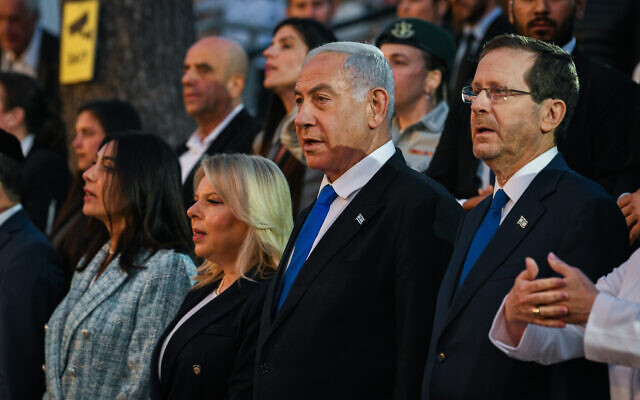Coalition claims imminent understandings in judicial talks; opposition disagrees
Hebrew media runs a leaked document of general principles coming out of President’s Residence negotiations; opposition denies having received it, says no agreement reached
Carrie Keller-Lynn is a political and legal correspondent for The Times of Israel

As pressure mounts for the parties to judicial reform talks at the President’s Residence to report progress after two months of stalemate, two members of the coalition’s negotiating team have said that a memorandum codifying principles under which the talks will continue can be expected in the next few days, although opposition sources have denied supporting such a declaration.
“There are agreements that already exist,” Likud MK Hanoch Milwidsky, a coalition negotiator, told Army Radio on Thursday. His statement came a day after his colleague in the talks, Likud MK Keti Shitrit, said that “within a day, a sort of memorandum of understanding will come out of the President’s Residence.”
But a source in the opposition with knowledge of the talks told The Times of Israel on Thursday that “there are no agreements, there is no document, and when we asked to see a document we were told there isn’t one yet.”
“We haven’t been given a document and we haven’t agreed to anything,” the source reiterated, expressing frustration.
On Wednesday evening, Channel 13 news published a set of general principles, many of them mirroring broad consensus positions such as guaranteeing free elections, that were said to be part of the “document of principles.” Additional opposition sources denied that they had received a document to review.
All parties to the stalled talks agree that any discussion on what both sides deem the most critical issue at stake — whether to increase political control over selecting judges — is off the table for the moment.

Opposition party leaders Yair Lapid and Benny Gantz have been steadfast in their stance that they will not accept a partial deal on judicial reform, under the presumption that the coalition would take its incremental wins and return to the legislative table to continue with the rest of its desired package at a later date. They have also been clear that they will not agree to changes affecting the judiciary’s independence and subordinating judges to political influence.
Appearing to confirm the opposition’s fears, Milwidsky said in his Thursday interview that he hoped to achieve specific agreements on areas such as the authority of ministries’ legal advisers and whether judges could review government decisions by assessing their “reasonableness” — two areas previously leaked as potentially close to resolution — and then the coalition would “need to freeze the issue of the Judicial Selection Committee for a few months” before bringing the explosive issue back to the fore.
Opposition sources reiterated Thursday that the Judicial Selection Committee would be the hardest point to resolve, and they would not agree to piecemeal progress. Should the appointments panel be reserved as a closing issue to a deal done in stages, they fear the coalition would either not feel pressure, or would threaten to scrap previously agreed-upon points if the opposition did not bend on that issue.

Among the very broad details reported on Wednesday night, a potential document may include agreements to introduce a higher standing for Israel’s quasi-constitutional Basic Laws; choose judges based on professionalism and diversity; block judicial review over policy decisions; constrain legal advisers’ powers; strengthen the role of the Knesset; respect checks and balances; safeguard free elections; and improve judicial services for citizens.
The leaders of the Opposition to Dictatorship protest group, under the umbrella of organizations orchestrating weekly protests against the government’s plan to overhaul the judiciary, pushed opposition leaders to quit the “fake dialogue.”
According to a Wednesday evening statement from the group, “if all they agreed on during the long months of sitting in the President’s Residence is maintaining free elections and the principle of separation of powers, and on the other hand, [opposition leaders Benny] Gantz and [Yair] Lapid agree to harming the status of legal advisers and weakening judicial review — then the time has come to stop the fake dialogue.”
The parties were not expected to reconvene for talks on Thursday.









